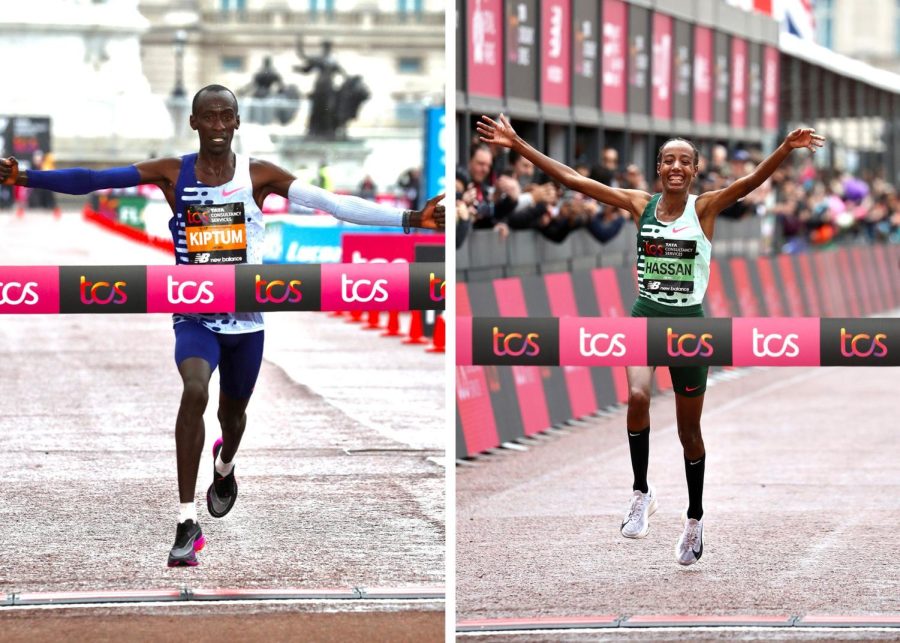London Marathon Shocks Fans around the World
May 5, 2023
Last week, on Sunday, April 23, at one of the capital cities of the world, the London Marathon commenced at 9:25 A.M. for the female runners and at 10 A.M. for the male runners of the race. Little did the participants, as well as the spectators, know that the race they were about to witness would signify the birth of two leading competitors with bright futures in the 26.2 mile race—Kelvin Kiptum and Sifan Hasssan. In only his second marathon race, Kiptum arrived seconds away from the world record after already having set it for the second half of the distance. Even more impressive, after having to stop a few times during the course, Hassan came out victorious in her debut, adding another accolade to her extensive list of running achievements. The two runners shocked critics and spectators around the world, as they managed to do the impossible with little to no prior experience.
For the male category, at the age of 23, Kenyan runner Kelvin Kiptum finished with a shocking time of 2:01:25—only 16 seconds away from Kipchoge’s world record. Coincidentally, the starter of the race turned out to be the world-record-holder himself, after his unfortunate performance at the Boston Marathon less than a week before, with Evans Chebet, the winner of this year’s Boston Marathon, cheering on the runners. During the event, Kiptum broke away from the others at around 30 km to run the fastest second-half of a marathon in history (59:45). When asked about how he felt during his performance, the 23-year-old said: “The secret is training. My preparation was good. Everything was going well.” Kiptum also won the Valencia Marathon in December of 2022, marking the fastest marathon debut ever and establishing himself as one of the three runners in history to have broken 2:02. On top of that, the race was stacked with several olympians and record-holders including Olympic track gold medalist Kenesisa Bekele, last year’s London Marathon winner Amos Kipruto, two-time New York City Marathon winner Geoffrey Kamworor, and four-time Olympic champion Mo Farah.
As for the female division, the Dutch distance-runner marked an unbelievable time of 2:18:33. Hassan had experienced multiple difficulties during the race, with a left hip cramp at about 16 km and having to stop twice in the first half in order to stretch her quad. Nonetheless, she impressively managed to catch up to the leading pack at around the 40th kilometer mark to immediately separate herself from the group and use her track speed to sprint down to the finish line. For most of the way, the head group was led by Olympic marathon champion Peres Jepchirchir until Hassan took the reins for the last two kilometers. Ethiopian Alemu Megertu, who had remained with the pack for the entire way, also sped past Jepchirchir to clinch second place (2:18:37) with Jepchirchir finishing a second after. Hassan expressed her enthusiasm in her post-race interview with BBC: “They said the marathon would hurt but I felt really good, even after 5km and 15km! When I saw the finish line, I thought, ‘Is that really it?’” In addition to her huge marathon win, at the 2020 Tokyo Olympics, Hassan clinched gold medals for the 5,000 and 10,000 meter races and a bronze medal for the 1500 meter, becoming the first athlete in Olympic history to earn medals in a middle-distance and two long-distance events in one Games and the second woman to perform in double distance events. Most impressively, she holds the world records for the mile, the 5km on the road, and the 1-hour run, and she carries five European records (1500m, 3000m, 5000m, 10,000m, and half-marathon), as well as four other records in the Netherlands. After now completing her marathon endeavor, Hassan’s focus returns to the World Athletics Championships, which take place in Budapest during the month of August.
Now that half of the six major marathons are over, a lot has changed in the running world—records have been shattered, rankings have been switched, expectations have been overturned—which only leaves the minds of the fans in wonder of what could happen for the next three races in the second half of the year. Will there be more upsets that will further rock the marathon community? Will there be more shocking debuts? Or, will the throne return to the favorites? Fans and critics will have to wait and see, starting with the Berlin Marathon in September.


















































































































































